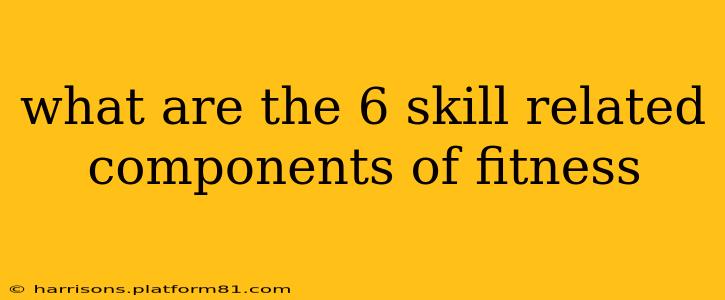The 6 Skill-Related Components of Fitness: Mastering Your Body's Potential
Physical fitness isn't just about how much you can lift or how far you can run. It's also about the skills your body can perform. These are the skill-related components of fitness, crucial for athletic performance and overall well-being. Understanding and developing these skills can significantly improve your athletic ability, reduce injury risk, and enhance your quality of life. Let's delve into the six key components:
1. Agility: Quick and Efficient Movement
Agility refers to your ability to change direction quickly and efficiently while maintaining balance and control. It's not just about speed, but about the control and precision of your movements. Think of a basketball player dribbling through defenders, a tennis player reacting to a fast serve, or a dancer executing intricate steps. Improving agility involves exercises like cone drills, shuttle runs, and lateral movements.
2. Balance: Maintaining Equilibrium
Balance is the ability to maintain equilibrium while stationary or moving. A good sense of balance is essential in many sports and activities, and also helps prevent falls in everyday life. Exercises such as yoga, tai chi, and single-leg stances can significantly enhance your balance. Developing strong core muscles is also vital for improving balance.
3. Coordination: Smooth and Efficient Movement Patterns
Coordination involves the ability to use your senses together with your body parts to perform smooth, controlled movements. It's about the seamless integration of your body's systems. Examples include throwing a ball accurately, catching a fly ball, or playing a musical instrument. Improving coordination often requires practice and repetition of specific movements.
4. Power: Explosive Strength
Power combines speed and strength to produce explosive movements. It's not just about how much you can lift, but how quickly you can lift it. Think of a weightlifter performing a clean and jerk, a baseball pitcher throwing a fastball, or a long jumper taking off for a leap. Plyometrics (jump training), weight training with explosive movements, and speed drills are effective ways to improve power.
5. Reaction Time: Responding Quickly to Stimuli
Reaction time measures how quickly you can respond to a stimulus. This is critical in sports where quick reactions are essential, like tennis, boxing, or martial arts. Improving reaction time involves drills that test your responsiveness to visual, auditory, or tactile cues. Regular practice and focused training can significantly shorten your reaction time.
6. Speed: Covering Distance Quickly
Speed refers to the ability to move your body or body parts quickly. It's crucial in many sports and activities, from sprinting to swimming to cycling. Developing speed requires training focused on high-intensity interval training (HIIT), plyometrics, and speed drills tailored to the specific sport or activity.
Frequently Asked Questions (FAQs)
How can I improve my overall skill-related fitness?
Improving your skill-related fitness requires a multifaceted approach. Regular participation in activities that challenge these components, such as sports, dance, or specialized fitness classes, is crucial. Combining this with targeted exercises like agility drills, balance exercises, and plyometrics will yield the best results. Remember consistency and proper technique are key.
Are skill-related fitness components only important for athletes?
No, these components are vital for everyone, regardless of athletic aspirations. Good balance helps prevent falls, agility improves everyday movement, and coordination enhances efficiency in various tasks. Stronger reaction time and speed improve overall responsiveness and quality of life.
Can I improve these skills at any age?
Yes! While younger individuals might have a natural advantage, individuals of all ages can significantly improve their skill-related fitness through dedicated training and practice. Adaptive exercises can be incorporated to suit individual needs and limitations.
What is the relationship between skill-related fitness and health-related fitness?
Skill-related and health-related fitness are interconnected. While health-related fitness focuses on aspects like cardiovascular health, muscular strength, and flexibility, skill-related fitness builds upon these foundations. Stronger muscles and better cardiovascular health will support improved agility, power, and speed. The two work synergistically to enhance overall fitness.
By focusing on these six skill-related components, you can unlock your body's full potential, improving not only athletic performance but also your overall health, well-being, and quality of life. Remember to consult with a healthcare professional or certified fitness trainer before starting any new exercise program.
